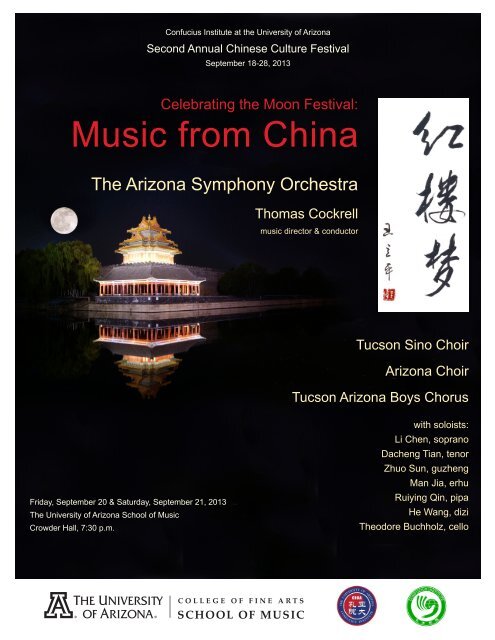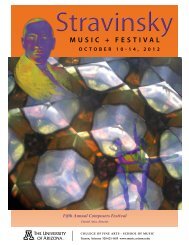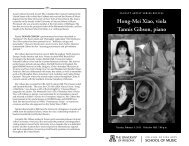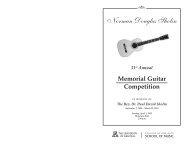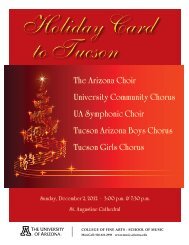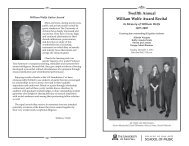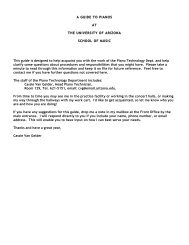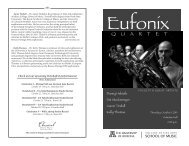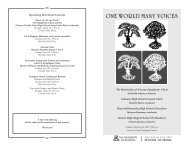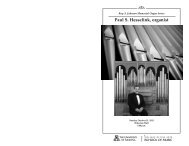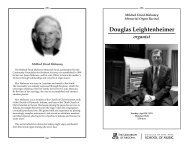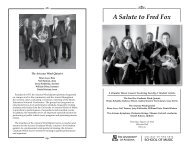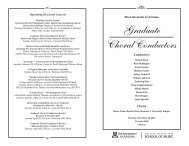Download Event Program - School of Music - University of Arizona
Download Event Program - School of Music - University of Arizona
Download Event Program - School of Music - University of Arizona
- No tags were found...
Create successful ePaper yourself
Turn your PDF publications into a flip-book with our unique Google optimized e-Paper software.
Confucius Institute at the <strong>University</strong> <strong>of</strong> <strong>Arizona</strong>Second Annual Chinese Culture FestivalSeptember 18-28, 2013Celebrating the Moon Festival:<strong>Music</strong> from ChinaThe <strong>Arizona</strong> Symphony OrchestraThomas Cockrellmusic director & conductorTucson Sino Choir<strong>Arizona</strong> ChoirTucson <strong>Arizona</strong> Boys ChorusFriday, September 20 & Saturday, September 21, 2013The <strong>University</strong> <strong>of</strong> <strong>Arizona</strong> <strong>School</strong> <strong>of</strong> <strong>Music</strong>Crowder Hall, 7:30 p.m.with soloists:Li Chen, sopranoDacheng Tian, tenorZhuo Sun, guzhengMan Jia, erhuRuiying Qin, pipaHe Wang, diziTheodore Buchholz, celloCollege <strong>of</strong> Fine Arts<strong>School</strong> <strong>of</strong> <strong>Music</strong>
nWelcome!It has been a magnificent journey for the Confucius Institute at the UA (CIUA) to work with the UA <strong>School</strong> <strong>of</strong> <strong>Music</strong> andTucson Sino Choir to produce this premier concert as a centerpiece <strong>of</strong> the CIUA Second Annual Chinese Culture Festival.Our heartfelt appreciation goes to Mr. Wang Liping ( 王 立 平 ), the internationally renowned composer <strong>of</strong> the Chinesetelevision series, Dream <strong>of</strong> the Red Chamber. Mr. Wang’s thoughtful and generous support for the arrangement <strong>of</strong>his beloved music into a new symphonic suite by UA’s Dr. Larry Lang, an accomplished and internationallyrespected musician in his own right, has made this event possible. Our heartfelt thanks also go to the musiciansfrom Shaanxi Normal <strong>University</strong> in Xi’an, led by Dean Tian; and our special guest soprano, Ms. Chen Li ( 陈 力 ),who was the television series’ original soloist, for her angel’s voice and poignant interpretation <strong>of</strong> these powerful lyrics.We also extend great appreciation for the support <strong>of</strong> the Confucius Institute Headquarter (Beijing), Shaanxi Normal<strong>University</strong>, and the China Central Institute for Culture and History. We are likewise extremely gratefulfor the participation <strong>of</strong> our local musicians and especially Maestro Thomas Cockrell,<strong>Music</strong> Director and Conductor <strong>of</strong> the <strong>Arizona</strong> Symphony Orchestra.Together we have made the dream <strong>of</strong> ”West meeting East” come true.Tonight, with the full moon overhead and good friends all around us, let’s enjoy and cherishthis evening’s touching music as an extraordinary Chinese cultural event!Thank you all for your presence andHappy Mid-Autumn Festival!中 秋 节 快 乐 !Sincerely,Zhao Chen, PhD, MPHPr<strong>of</strong>essor and Co-directorCIUAJohn W. Olsen, PhDRegents’ Pr<strong>of</strong>essor and Co-directorCIUAOn behalf <strong>of</strong> the students, staff, and faculty <strong>of</strong> the <strong>School</strong> <strong>of</strong> <strong>Music</strong> we welcome you to this remarkable concert.We welcome the international performing artists who are here to share and inspire all <strong>of</strong> us with their prodigious talents.The more we share and experience our respective musical traditions we are drawn to the unique beauty and diversity<strong>of</strong> expression evident throughout the world. We recognize, moreover, that there is much in all <strong>of</strong> our traditionsthat is universal. The <strong>School</strong> <strong>of</strong> <strong>Music</strong> is delighted to partner in this wonderful festival with theConfucius Institute and we look forward to many more magical exchanges.Sincerely,Rex A. Woods, MM, JDDirector<strong>School</strong> <strong>of</strong> <strong>Music</strong>- 3 -
nCelebrating the Moon Festival: <strong>Music</strong> from China<strong>Arizona</strong> Symphony OrchestraThomas Cockrell, ConductorTucson Sino Choir - Larry Lang, Conductor<strong>Arizona</strong> Choir - Bruce Chamberlain, ConductorTucson <strong>Arizona</strong> Boys Chorus - Julian Ackerley, ConductorSoloists:Li Chen, sopranoDacheng Tian, tenorZhuo Sun, guzhengMan Jia, erhuRuiying Qin, pipaHe Wang, diziTheodore Buchholz, celloFriday September 20 & Saturday September 21, 2013Crowder Hall, 7:30 p.m.p r o g r a mSymphonic Suite: Dream <strong>of</strong> the Red Chamber 交 响 组 曲 :《 红 楼 梦 》 ...............................................Wang Liping (b. 1941)(North American première)arr. Larry LangOvertureFirst Movement: Bao-yu & Dai-yuSong <strong>of</strong> Amaryllis EyotThree Verses Written on HandkerchiefsSong <strong>of</strong> Red Love-BeansHope BetrayedSecond Movement: The Faith <strong>of</strong> the Ladies <strong>of</strong> the Red ChamberSong <strong>of</strong> SkybrightSong <strong>of</strong> CaltropFrom Dear Ones PartedCaught by Her Own CunningThird Movement: Burying the FlowersAutumn Window: A Night <strong>of</strong> Wind and RainBurying the FlowersLi Chen, sopranoDacheng Tian, tenorTucson Sino Choir, <strong>Arizona</strong> ChoirZhuo Sun, guzhengMan Jia, erhuRuiying Qin, pipaHe Wang, diziI n t e r m i s s i o nPeking Opera: Snow Forest 京 剧 管 弦 乐 :《 林 海 雪 原 》...................................................................................arr. Larry LangChinese Ensemble: Sunset Flute Drum 民 乐 合 奏 :《 夕 阳 箫 鼓 》............................................................................traditionalZhuo Sun, guzhengMan Jia, erhuRuiying Qin, pipaHe Wang, dizi- 4 -
nHeaven, Earth, Mankind (Symphony 1997), excerpts 交 响 乐 1997 :《 天 地 人 》( 节 选 )......................Tan Dun (b. 1957)Theodore Buchholz, celloTucson <strong>Arizona</strong> Boys Chorus, <strong>Arizona</strong> ChoirHeavenCeremony (Jasmine Flower)Such a beautiful jasmine flowerBranches full <strong>of</strong> sweet white buds,Everyone loves their beauty,I will gather some and <strong>of</strong>fer themTo the one I love,Jasmine flower, jasmine flower.PhoenixJubilationEarthOpera in Temple Street(The Empress, accepting fate, poignantly sings farewell to the Emperor.Recording made in Hong Kong’s Temple Street, 1997.)MankindRequiemLullabyDon’t cry Nanjing, my baby.See all the boats sailing on the swiftly flowing Yangtze.Give her a kiss if you meet the Moon.Send him your regards if you see the Sun.Song <strong>of</strong> Peace(In the spirit <strong>of</strong> Li Po, recalling Schiller/Beethoven)Heaven, Earth and all Mankind listen!The bells which no longer sound “farewell”Knock at spring’s door,The wind <strong>of</strong> winter past blows the bugle <strong>of</strong> jubilation,The drum, no longer announcing war, plays with everlasting harmony,The mother, no longer crying, sings <strong>of</strong> joyous peace.Ah! Heaven, Earth and Mankind are symbolic.Everything in the world is one.- 5 -
n<strong>Program</strong> NotesThe Novel: “The Dream <strong>of</strong> the Red Chamber”The Dream <strong>of</strong> the Red Chamber, also known as The Story <strong>of</strong> the Stone, is a long and complex novel set in the Qing Dynasty(18th century) household <strong>of</strong> the wealthy and well-connected Jia family. On one level, the novel is a coming-<strong>of</strong>-age story <strong>of</strong> theyoung boy <strong>of</strong> the family, Bao-yu, and <strong>of</strong> his female cousins. On another level, however, it is an important literary attempt touse fiction—traditionally viewed as a non-serious art form—to explore pr<strong>of</strong>ound social, moral and religious questions.Although Dream is primarily a work <strong>of</strong> fiction and even includes some fantastical elements, it also gives a detailed view<strong>of</strong> Qing Dynasty society, especially the lives and lifestyles <strong>of</strong> the elite. The novel is particularly important in revealing theextended family unit and the complex <strong>of</strong> rules and customs that governed the interactions among family members, servants,and between older and younger generations. The novel also goes into great detail about the minutiae <strong>of</strong> life in an upper-classQing household, including its clothing, food, economics, entertainments, and sexual mores.Lyric poetry and music are central to Dream. The young people <strong>of</strong> the Jia household frequently organize poetry gatheringsduring which they compose poetry according themes, or they attend performances where they listen to the arias <strong>of</strong> famousChinese operas. Poetry is also important in the novel as a literary device. Through lyrics composed by and about the youngpeople, the author is able to uncover truths about characters’ feelings that they would never speak about directly, as well asreveal hidden elements <strong>of</strong> their personalities and provide foreshadowing <strong>of</strong> events to come.Symphonic Suite: “The Dream <strong>of</strong> the Red Chamber” by Wang Liping (1987/2013)The original score composed in 1987 by Mr. Wang Liping was for the television series, “The Dream <strong>of</strong> the Red Chamber”(36 episodes) broadcast by China Central Television (CCT). The theme songs <strong>of</strong> this TV series have been well received andtouched every audience with their beauty.From 2005 to 2007 Mr. Wang rearranged his music into a suite <strong>of</strong> eleven songs and four orchestral pieces. The “Soprano SoloConcert” was accompanied by a Chinese traditional orchestra (erhu, pipa, dizi and guzheng and other Chinese instruments).Mr. Wang, soprano Wu Bixia and conductor Zhang Lie toured China, Hong Kong, Taiwan and Singapore to great acclaim.With the permission and support <strong>of</strong> the composer, Dr. Larry Lang <strong>of</strong> the <strong>University</strong> <strong>of</strong> <strong>Arizona</strong> has rearranged andorchestrated Wang’s music into a symphonic suite <strong>of</strong> three movements and an overture. He added a chorus to a fullsymphonic orchestra to present Wang’s music in the manner <strong>of</strong> classical symphonic works. These concerts at the<strong>University</strong> <strong>of</strong> <strong>Arizona</strong> will be the North American première concert <strong>of</strong> Wang’s music for The Dream <strong>of</strong> the Red Chamber.– Brigitta LeeOvertureFirst Movement: Bao-yu and Dai-yu紫 菱 洲 歌 / 贾 宝 玉 (Jia Bao-yu) Song <strong>of</strong> Amaryllis EyotThe young people <strong>of</strong> the Jia household all lived together inProspect Garden, a large garden ensconced within the walls <strong>of</strong>the Jia mansion. The words <strong>of</strong> this song are a poem the young boyBao-yu composed when he roamed the grounds <strong>of</strong> Amaryllis Eyot,the name <strong>of</strong> the garden residence <strong>of</strong> his female cousin Ying-chun.In anticipation <strong>of</strong> Ying-chun’s marriage to an Army <strong>of</strong>ficer, Yingchun’smother had her moved out <strong>of</strong> the garden, leaving AmaryllisEyot deserted. Bao-yu, in roaming the grounds <strong>of</strong> the now quietresidence, composed the poem to express his feeling <strong>of</strong> loss atYing-chun’s departure.题 帕 三 绝 / 林 黛 玉 (Lin Dai-yu)Three Verses Written on HandkerchiefsJia Bao-yu shared a special, almost fated, relationship with hisdistaff cousin, Lin Dai-yu, a sensitive and <strong>of</strong>ten sickly young girl.On the pretext <strong>of</strong> <strong>of</strong>fering her a gift <strong>of</strong> handkerchiefs, Bao-yu senthis servant Skybright to enquire after Dai-yu. Dai-yu, confusedand excited in trying to discern the meaning <strong>of</strong> the gift, finds herselfputting her stirred up feelings into verse and writing them on thehandkerchiefs she had received as a gift.- 6 -
n红 豆 词 / 贾 宝 玉 (Jia Bao-yu) Song <strong>of</strong> Red Love-BeansAlthough sung during a drinking game with some <strong>of</strong> his male cousins, Bao-yu’s song about grief over an ill-fatedromance nevertheless strikes the listener with its foresight <strong>of</strong> actual events.枉 凝 眉 / 林 黛 玉 (Lin Dai-yu) Hope BetrayedThis is one <strong>of</strong> the songs included in the “Dream <strong>of</strong> Golden Days” song serieswritten by the Fairy <strong>of</strong> Disenchantment and performed for Bao-yu during hisdream visit to the Land <strong>of</strong> Illusion. It reveals the sad fate <strong>of</strong> Lin Dai-yu, Bao-yu’scousin on his mother’s side. The song reveals Lin Dai-yu’s sensitive nature andpassionate heart, both <strong>of</strong> which endear her to Bao-yu but also make her susceptibleto fatal levels <strong>of</strong> jealousy and melancholy.分 骨 肉 / 探 春 (Tan-chun) From Dear Ones PartedSecond Movement: The Faith <strong>of</strong> the Ladies <strong>of</strong> the Red Chamber晴 雯 歌 Song <strong>of</strong> SkybrightOne <strong>of</strong> Bao-yu’s maids, Skybright is a quick-tempered but devoted servant.Bao-yu’s mother, concerned that her son is easily led astray, accuses Skybright<strong>of</strong> being a bad influence and has her transferred out <strong>of</strong> service. Skybright diessoon after <strong>of</strong> consumption. Bao-yu, who was very attached to Skybright,composes this elegy to her.叹 香 菱 Song <strong>of</strong> CaltropCaltrop, whose full name was Zhen Yinglian, was a maid in the household <strong>of</strong>Bao-yu’s Aunt Xue. Bao-yu’s lecherous cousin, Xue Pan, takes Caltrop as a concubineand abuses her. Caltrop is also mistreated by Xue Pan’s shrewish wife, Jin-gui.This is also one <strong>of</strong> the songs included in the “Dream <strong>of</strong> Golden Days” song series written by the Fairy <strong>of</strong> Disenchantmentand performed for Bao-yu during his dream visit to the Land <strong>of</strong> Illusion. The song reveals the sad fate <strong>of</strong> Jia Tan-chun,Bao-yu’s half-sister, who was married <strong>of</strong>f to a man holding a post in a far-flung province where she would live in exilefrom her family.聪 明 累 / 王 熙 凤 (Wang Xifeng) Caught by Her Own CunningThis is one <strong>of</strong> the songs included in the “Dream <strong>of</strong> Golden Days” song series.It reveals the sad fate <strong>of</strong> Wang Xi-feng, “Bright phoenix” Wang, the wife <strong>of</strong>Bao-yu’s cousin, Jia Lian.Third Movement: Burying the Flowers秋 窗 风 雨 夕 / 林 黛 玉 (Lin Dai-yu) Autumn Window: A Night <strong>of</strong> Wind and RainHomebound during one <strong>of</strong> her bouts <strong>of</strong> illness, Dai-yu reads a volume <strong>of</strong> poetryon sorrow and parting. She is moved by the verse and is compelled to write herown song <strong>of</strong> separation, expressing melancholy at the arrival <strong>of</strong> autumn.葬 花 吟 / 林 黛 玉 (Lin Dai-yu) Burying the FlowersDai-yu’s father had sent her to live with her maternal grandmother Jia afterDai-yu’s mother died. Constantly aware <strong>of</strong> her situation as an outsider in theJia family, Dai-yu feels slighted easily and succumbs to feelings <strong>of</strong> sorrow andrejection. Contemplating the falling <strong>of</strong> flower petals in the spring, Dai-yucomposes this verse, likening herself to the fallen petals and thinking on theeventuality <strong>of</strong> her own death.– Brigitta Lee- 7 -
nPeking Opera: “Snow Forest” arranged by Larry LangPeking Opera has a history <strong>of</strong> over 300 years in China. It is not really opera associated solely with Beijing area, butis rather a special type <strong>of</strong> play with singing, dancing and dialogue known in Chinese as “Jing-Xi.” The music <strong>of</strong> Jing-Xi isvery special, different from all other Chinese traditional music and folk songs in the way that jazz is different fromother forms <strong>of</strong> American music.Inspired by the music <strong>of</strong> Jing-Xi, I made an arrangement <strong>of</strong> a tenor aria titled “Snow Forest”- “Da-Hu-Shang-Shan” 京 剧管 弦 乐 :《 林 海 雪 原 》for symphony orchestra, to expose American audiences for the first time to the beauty <strong>of</strong> this specialChinese music. A musical painting <strong>of</strong> a snowy forest in northeast China emerges in this music. Based on a story from 1948,a brave Chinese solder, in conflict with terrorists, eventually wins the battle.– Larry Lang“Sunset Flute & Drum” – traditionalSunset Flute & Drum is a masterwork <strong>of</strong> Chinese traditional music. It is elegant, graceful and lyrical, painting a landscape<strong>of</strong> a quiet night in spring, with the moon rising. A canoe on the river creates ripples, flowers bloom along the river banks,depicting a perfect breathtaking scene <strong>of</strong> southern China. The original music is composed for pipa solo, and will beperformed by an ensemble <strong>of</strong> pipa, guzheng, erhu and dizi in this concert.– Larry LangHeaven Earth Mankind (Symphony 1997), excerpts, by Tan DunCommissioned by the Hong Kong government to celebrate the reunification <strong>of</strong> Hong Kong with China on July 1, 1997,Tan’s 70-minute symphony is a dramatic montage that captures the panorama <strong>of</strong> human history and the longings <strong>of</strong> ourspirit. It joins the cultures <strong>of</strong> the East and West: reflecting the Chinese aesthetic <strong>of</strong> using celebratory music as a vehicle forspiritual contemplation while featuring lush Romantic harmonies and sweeping lines characteristic <strong>of</strong> Western music. Tanconspicuously adapts African rhythms and melodies known to audiences in the East and West, including the folk song“Jasmine Flower” (used by Puccini in Turandot) and Beethoven’s Ode to Joy. Taoist philosophy colors the Symphony throughits tripartite division <strong>of</strong> Heaven, Earth and Mankind. The work concludes with a hymn to universal freedom and peace, aspiritual descendant <strong>of</strong> Beethoven’s Ninth Symphony. The Symphony envisions a new world, one in which the arrogance<strong>of</strong> isolationism, colonialism and imperialism has finally yielded to a global community.– Mary Lou Humphrey- 8 -
nAbout the SoloistsLi Chen, sopranoChen was a Peking Opera singer when Mr. Wang composed his beloved TV series music,Dream <strong>of</strong> the Red Chamber. From among hundreds <strong>of</strong> top sopranos in China, she was selectedby Mr. Wang to be the only solo singer <strong>of</strong> the entire television series. Since then the name<strong>of</strong> Li Chen has been connected with the music <strong>of</strong> Dream <strong>of</strong> the Red Chamber in the hearts <strong>of</strong>millions <strong>of</strong> Chinese people. Ms. Chen has a pure and touching voice, and has presented thebest recording <strong>of</strong> Wang’s music and the Chinese people have affirmed that Li Chen wasborn to sing the Dream <strong>of</strong> Red Chamber.Dacheng Tian, tenorOperatic tenor Dacheng Tian is the Dean <strong>of</strong> the <strong>School</strong><strong>of</strong> <strong>Music</strong> at Shaanxi Normal <strong>University</strong>. He graduatedfrom Tokyo <strong>University</strong> <strong>of</strong> the Arts with a Doctor <strong>of</strong> <strong>Music</strong>alArts in opera. Dr. Tian has studied with Regine Crespin and Camille Maurane in France andwas admitted to the master classes <strong>of</strong> Vittorio Terranova in Italy. Dr. Tian has performed thelead roles in La Traviata and Carmen, among others, in Japan and China. He frequently <strong>of</strong>ferssolo recitals and has been tenor soloist for Beethoven’s Ninth Symphony, Mozart’s Requiem,and Handel’s Messiah. Dr. Tian’s CD albums include Tian: French Arts Songs (Adam recordpublisher, Japan, 1998); Tian: French & Italian Opera Arias (Kojima record publisher, Japan,2002); and Tian: Chinese and Japanese Songs (Kojima record publishers, 2005).Zhuo Sun, guzhengZhuo Sun is Associate Pr<strong>of</strong>essor <strong>of</strong> <strong>Music</strong> at the <strong>School</strong> <strong>of</strong> <strong>Music</strong>, Shaanxi Normal<strong>University</strong>. Ms. Sun studied guzheng from childhood with her mother, Qu Yun, a famousguzheng artist in China. Sun plays all types <strong>of</strong> traditional guzheng music and is committed toexploring contemporary interpretations. She has performed with the Chinese Youth NationalOrchestra, National <strong>Music</strong> Orchestra <strong>of</strong> the Xi’an Conservatory <strong>of</strong> <strong>Music</strong>, the ContemporaryOrchestra at Sheffield <strong>University</strong> and the German Chamber Orchestra. Sun received herbachelor’s and master’s degrees from the Central Conservatory <strong>of</strong> <strong>Music</strong> in Beijing andher Ph.D. in ethnomusicology from The <strong>University</strong> <strong>of</strong> London. Recordings by Sun include:“XiangYun ” (Longyin Ltd <strong>of</strong> Hong Kong, 2001); “Gorgeous ” (China <strong>Music</strong> PublishingHouse, 2003); and “Sound <strong>of</strong> The Mother and Daughter” (China Recording Corporation,2008).Man Jia, erhuMs. Jia is Associate Pr<strong>of</strong>essor <strong>of</strong> erhu at the <strong>School</strong> <strong>of</strong> <strong>Music</strong>, Shaanxi Normal <strong>University</strong>.As a Shaanxi native, Ms. Jia began studying the erhu at age 10 under her father’s tutelage.She has been engaged by the Shaanxi Opera Orchestra since 1990. With the Shaanxi ArtsGroup she has performed on concert tours as erhu soloist in France, Germany, Austria,Singapore, Japan, and Hong Kong, among other locations. In 2005 she received aCertificate <strong>of</strong> Honor from the Golden Concert Hall <strong>of</strong> Vienna for her performancein the concert, The Rhythm <strong>of</strong> Chinese Folk <strong>Music</strong>.- 9 -
nRuiying Qin, pipa<strong>Music</strong> Instructor <strong>of</strong> pipa at the <strong>School</strong> <strong>of</strong> <strong>Music</strong>, Shaanxi Normal <strong>University</strong>,Ms. Qin has comprehensive skills and solid strengths in pipa performance.Her music is full <strong>of</strong> energy and elegance, exhibiting the beauty andenthusiasm <strong>of</strong> the style <strong>of</strong> northwest China.He Wang, diziHe Wang is Associate Pr<strong>of</strong>essor and Head <strong>of</strong> <strong>Music</strong>Performance at the <strong>School</strong> <strong>of</strong> <strong>Music</strong>, Shaanxi Normal<strong>University</strong>, where is the conductor <strong>of</strong> the SNNU symphonyorchestra. Mr. Wang was instrumental in the establishment<strong>of</strong> “Tang Yun” (Tang Dynasty style) Opera, and is DeputyDirector <strong>of</strong> this artistic venture. Mr. Wang receivedrecognition as Chinese <strong>Music</strong> Artist <strong>of</strong> the Year by theChinese Ministry <strong>of</strong> Culture in 2006. He has released CD recordings <strong>of</strong> solo bamboo flute:“Thoughts,” “Tears <strong>of</strong> the Qujiang River,” “Spring Breed ,” “Chen-xiang Pavilion” and“The Waterfall in Chang-An.”Theodore Buchholz, celloCellist Theodore Buchholz has been lauded by The <strong>Arizona</strong> Daily Staras a “virtuosic cellist,” The Post and Courier as an “outstanding performer,”and The Charleston City Paper as a “wonderful musician.” Making his debutat New York City’s Merkin Hall in 2006, he annually performs in over seventyconcerts as a soloist, recitalist, chamber musician, and orchestra sectionmember. He was the Principal Cellist <strong>of</strong> the Spoleto Festival Orchestra,Associate Principal Cellist <strong>of</strong> the Stockton Symphony for four years, and iscurrently a core member <strong>of</strong> the Tucson Symphony Orchestra. Dr. Buchholzstudied at the Manhattan <strong>School</strong> <strong>of</strong> <strong>Music</strong>, the San Francisco Conservatory<strong>of</strong> <strong>Music</strong>, and the <strong>University</strong> <strong>of</strong> <strong>Arizona</strong>. As a leader in music education,Dr. Buchholz serves as President-Elect <strong>of</strong> the American String TeachersAssociation <strong>of</strong> <strong>Arizona</strong>, is the director <strong>of</strong> the Tucson Cello Congress,and is on faculty at Pima Community College.- 10 -
nAbout the ComposersWang LipingMr. Wang Liping is one <strong>of</strong> greatest Chinese film composers <strong>of</strong> all time. Since hisgraduation from the Central Conservatory <strong>of</strong> <strong>Music</strong> in Beijing in 1965, Wang hasbeen a Resident Composer with the China Radio and Film Symphony Orchestra.For over 40 years he has composed the most popular and recognizable movie musicand theme songs for movies, television series and other broadcasts in China, including“Shaolin Temple,” “Traveler with Handcuffs,” “Calling by the Sea” and the mostbeloved, “Dream <strong>of</strong> the Red Chamber,” which has been selected for inclusion in thecollection <strong>of</strong> “Masterworks <strong>of</strong> Chinese <strong>Music</strong> in the 20th Century.” Other notableworks by Wang include: “Lady Divers,” “Summer <strong>of</strong> Harbin,” and “Hua Mulan,”among others. All <strong>of</strong> his works have been recorded under the China Record PublishingHouse label. Wang has also composed numerous classical concerts and he served asthe <strong>Music</strong> Director <strong>of</strong> the China Radio and Film Orchestra until his retirement.Wang’s talent is not limited to music; he also is one <strong>of</strong> the outstandingphotographers and calligraphers <strong>of</strong> China. He is an honorary member <strong>of</strong>the China Photographers Association and China Calligraphers Association.Tan DunThe composer/conductor Tan Dun has made an indelible mark on the world’s musicscene with a creative repertoire that spans the boundaries <strong>of</strong> classical, multimedia,Eastern and Western musical systems. Opera has a significant role in Tan Dun’s creativeoutput <strong>of</strong> the past decade, most recently with the premiere <strong>of</strong> “The First Emperor” bythe Metropolitan Opera in December 2006 with a title role created for Plácido Domingo.In 2008, Tan composed Internet Symphony No. 1: “Eroica” commissioned by Google/YouTube as the focal point for the world’s first collaborative online orchestra. Of hismany works for film, Tan Dun’s score for Ang Lee’s film “Crouching Tiger, HiddenDragon” received an Oscar Award for best original score. His dedicated work wascelebrated when UNESCO appointed Tan Dun as its global Goodwill Ambassador.Larry X. LangLarry Lang graduated from the <strong>University</strong> <strong>of</strong><strong>Arizona</strong> with his Doctor <strong>of</strong> <strong>Music</strong>al Arts degree inviolin and conducting in 1992, and is currently the Artistic Director <strong>of</strong> the <strong>Arizona</strong>Chinese New Year Festival and <strong>Music</strong> Director <strong>of</strong> the Tucson Sino Choir. A native <strong>of</strong>Beijing, Larry “is an outstanding violinist,” according to Sir Edward Heath, formerPrime Minister <strong>of</strong> the UK, “He was frequently called upon to play for visiting dignitaries,and he clearly held a prominent position in the music world in Beijing.” As a concertviolinist, Larry has performed with the Oregon Bach Festival Orchestra, TucsonSymphony Orchestra, Tucson Pop Orchestra and the American Festival Orchestra.Larry’s prime interest has always been to promote cultural ties between two greatcountries – China and America. His solo debut with the Southern <strong>Arizona</strong> SymphonyOrchestra was the Chinese violin concerto “The Butterfly Lovers” by He and Chen.As a composer and arranger, Larry’s debut cinematic musical score, composed forJet Li’s 1985 “Bi-Xue-Zhu-Guang”, combined a symphony orchestra with traditionalChinese instruments. This activity and style continues in his new arrangements <strong>of</strong>“Dream <strong>of</strong> the Red Chamber” by Wang Liping and the Peking Opera “Snow Forest.” Larry was a finalist nomineefor the 2012 <strong>Arizona</strong> Governor’s Arts Award, a member <strong>of</strong> the UA President’s Asian Pacific Council, and has receivedan Outstanding Community Member Award from the Asian American Faculty and Staff Alumni Association at UA .- 11 -
nAbout the ConductorsJulian AckerleyDirector <strong>of</strong> the Tucson <strong>Arizona</strong> Boys Chorus since 1980, Julian Ackerley has achievedinternational acclaim as an accomplished conductor and administrator <strong>of</strong> choral performingarts organizations. Dr. Ackerley was selected Choral Director <strong>of</strong> the Year for 2012 by theAmerican Choral Directors Association <strong>Arizona</strong> Chapter. He was recognized for his“excellence to the pr<strong>of</strong>ession <strong>of</strong> choral music.”Dr. Ackerley has taken the Boys Chorus on performance tours spanning five continentsand over 25 countries. Under his direction, the Chorus has made numerous recordings andhas collaborated with national symphony orchestras and opera companies.Dr. Ackerley is an experienced teacher, having taught music at all levels from elementaryto university students. He received his Doctor <strong>of</strong> <strong>Music</strong>al Arts degree from the <strong>University</strong> <strong>of</strong><strong>Arizona</strong> with special emphasis in music education, vocal performance and choralconducting. He has long been a guest conductor and clinician at numerous choral festivalsand All-State choirs. He will conduct the Central Division Middle <strong>School</strong> Boys Honor Choirin Cincinnati, Ohio in February 2014 and the International Boys and Men’s Choral Festival in<strong>Arizona</strong> in July 2014.Dr. Ackerley is currently the National Boychoir Repertoire and Standards Chair for the American Choral DirectorsAssociation. In addition, he has served as Vice President for the International Society for Children’s Choral andPerforming Arts.Bruce ChamberlainDr. Bruce Chamberlain is Director <strong>of</strong> the Tucson Symphony Orchestra Chorus, Director<strong>of</strong> Choral Activities and newly named assistant director for academic student services <strong>of</strong>the <strong>University</strong> <strong>of</strong> <strong>Arizona</strong> <strong>School</strong> <strong>of</strong> <strong>Music</strong>. He brings to these positions over 30 years <strong>of</strong>pr<strong>of</strong>essional and collegiate experience. In addition to the standing-room-only performancesby the <strong>Arizona</strong> Choir on campus, just this year his guest appearances have included theTucson Symphony Orchestra, the Tennessee All-State Orchestra, an ACDA Central DivisionConference, an all-Brahms concert with the New York City Chamber Orchestra in CarnegieHall, the National Arabian Choir in Dubai, UAE, the International Conducting Institute atWestminster Choir College in Princeton, New Jersey, and he concluded the summerconducting concerti grossi <strong>of</strong> Handel, Bach and Stravinsky on the Saint Andrews BachSociety concert series in August.Previously, Chamberlain has appeared with the symphony orchestras <strong>of</strong> St. Petersburg(Russia), San Antonio (Texas), Jackson (Tennessee), the Imperial Symphony Orchestra(Florida), the Concerto Soloists Chamber Orchestra <strong>of</strong> Philadelphia, the Bohuslav MartinůPhilharmonic, the Czech Virtuosi Orchestra (Brno), the Budapest Chamber Orchestra, theOregon Bach Festival Orchestra, The Tucson Symphony Orchestra, The Tucson ChamberOrchestra, the New England Symphonic Ensemble, Festival Orchestra <strong>of</strong> Iowa and mostrecently, the SoliAll Philharmonic and Ryul Chamber Orchestra in Seoul, Korea.A summa cum laude graduate <strong>of</strong> the Indiana <strong>University</strong> Jacobs <strong>School</strong> <strong>of</strong> <strong>Music</strong> with bachelor’s, master’s and DMus degrees,Chamberlain studied conducting with Julius Herford, Margaret Hillis and John Nelson, piano with Menachem Pressler,Wallace Hornibrook and Nicholas Zumbro, and has continued choral/orchestral conducting studies with Helmut Rilling,Andrew Davis, Dale Warland and Robert Page.- 12 -
nThomas CockrellDr. Thomas Cockrell has served as the Nelson Riddle Endowed Chair in <strong>Music</strong>,Director <strong>of</strong> Orchestral Activities and <strong>Music</strong> Director <strong>of</strong> the UA Opera Theater since 2000.In November 2011 he was named artistic director <strong>of</strong> Opera in the Ozarks at Inspiration Pointin Eureka Springs, Arkansas, a training program and festival for advanced students andyoung pr<strong>of</strong>essionals. Cockrell is equally at home on the symphonic podium and in the operapit, working with pr<strong>of</strong>essionals or student musicians. He has conducted the pr<strong>of</strong>essionalsymphony orchestras <strong>of</strong> Dallas, Cincinnati, Phoenix, Tucson, Louisville, Boulder, OrangeCounty and several in Romania, Italy, Mexico and South Korea. Operatic credits includeproductions for Dayton Opera, Opera Colorado, Opera Theatre <strong>of</strong> the Rockies andWashington D.C.’s Summer Opera Theatre. He served as the Associate Conductor <strong>of</strong>Cincinnati Opera, Opera Colorado, The Colorado Symphony Orchestra and the SpoletoFestivals and <strong>Music</strong> Director <strong>of</strong> Denver Young Artists Orchestra. From 2006 to 2008 he wasa member <strong>of</strong> the conducting faculty <strong>of</strong> the Interlochen Arts Camp.Cockrell has been the conductor and clinician for regional and all-state music festivalsnationwide. He was chosen by his colleagues in the College Orchestra Directors Associationto be the master teacher for the conducting masterclasses at its 2008 national conference, andhas taught conducting master courses in the United States, Mexico, Asia and Europe. Before coming to the <strong>University</strong> <strong>of</strong><strong>Arizona</strong>, Cockrell was on the faculty <strong>of</strong> the <strong>University</strong> <strong>of</strong> California, Irvine and the State <strong>University</strong> <strong>of</strong> New York at Purchase.He has been a Visiting Pr<strong>of</strong>essor at the National Academy <strong>of</strong> <strong>Music</strong> in Bucharest, Romania and a Faculty Artist at the AcadémieInternationale de Musique, Château de Rangiport. Cockrell earned his Doctor <strong>of</strong> <strong>Music</strong>al Arts and Master <strong>of</strong> <strong>Music</strong> degreesfrom the State <strong>University</strong> <strong>of</strong> New York at Stony Brook and a Bachelor <strong>of</strong> Arts from Yale <strong>University</strong>. He studied conducting withFranco Ferrara in Rome and at Accademia <strong>Music</strong>ale Chigiana in Siena, Italy. Additionally, he was an Aspen Conducting Fellowand completed advanced training at the Conservatoire Américain in Fontainebleau, France and the Tanglewood <strong>Music</strong> Center,where he worked with Gustav Meier, Leonard Bernstein and Seiji Ozawa.- 13 -
nThe <strong>Arizona</strong> Symphony OrchestraThomas Cockrell, ConductorViolinLuis AlarcónEvgeniya Belinskaya*Oliver Blaylock**Ellen ChamberlainMichelle GuzmanSusanna LopezJuan LoraKaitlyn MillerHannah MilnerEmily NolanElizabeth PaeGabriela RincónRachel SchlesingerSarah ViningViolaSean ColbertNatalia DuarteKathryn HarpainterDenise JonesRaphael Lizama**Jung Eun OhTizheng ShenVioloncelloRebecca Bartelt**Stephen ChávezAaron FeeneyAnne GratzBassDallas Carpenter**Adam GurczakAmit SenJoaquín ZamudioHarpLauren HayesJoelle RoupPianoGlenda Courtois GarcíaFluteJoshua BarnesElyse Davis, piccoloKate NicholsOboeRachel KamradtMara RembelskiClarinetDaniel BeckerNatalie GroomBassoonMatthew KowalczykLisa MayerRebecca WatsonHornChristopher BlancoKatherine FackrellBrian GodshallMichael MesnerTrumpetAmy BurmeisterGlendon GrossKenneth SaufleyTromboneDavid AdamsBrian BeckerDylan CarpenterTubaMichael McLeanPercussionTrevor BarroeroDanny Barsetti-NerlandRyan BrockCameron FigueroaAssistant ConductorsAce EdwardsKeun Oh* Concertmaster** PrincipalThe <strong>Arizona</strong> Symphony Orchestra is one <strong>of</strong> the large ensembles vital to the educational and artistic mission <strong>of</strong> the<strong>University</strong> <strong>of</strong> <strong>Arizona</strong> <strong>School</strong> <strong>of</strong> <strong>Music</strong>. With the goals <strong>of</strong> training students in essential ensemble skills andperforming a broad cross section <strong>of</strong> the rich orchestral repertoire, the Symphony presents symphonicand chamber orchestra concerts as well as two productions with The <strong>University</strong> <strong>of</strong> <strong>Arizona</strong>Opera Theater each year. Concerts frequently feature faculty soloists and composers.Student soloists and conductors shine in the annual President’s Concert, whichin 2006 was also performed in Hermosillo and Alamos, Mexico, as thefestive finale <strong>of</strong> the prestigious Dr. Alfonso Ortíz Tirado<strong>Music</strong> Festival.- 14 -
nTucson Sino ChoirLarry Lang, <strong>Music</strong> Director & ConductorSopranoXianqiong BianMinying CaiYi ChenZhao ChenHui FangJiangxiang HuangXiangxia LuoWeihua JiangMarcia FestNing QuFushi WenXiaoli ZhangEllen ZhuAltoPeiqin CaoFeng ChenHongyi JiaPo LinChenglu LiuYuhong LiuCelia QianJingjing WangYan XuYing YuanGina ZhangLiying ZhuoTenorJinshui DaiYonghua HeJing MaWanmei NiHenry ShiMing SunPeter XuDongxiao ZhangBassJohn BolmYongji ChenJunshan HaoYun HuangLi WanZhongguo XiongJianwei ZhangXiaohui ZhangJie ZongAccompanistXiaotong ZhaoVoice CoachQin HeThe Tucson Sino Choir (TSC) is a non-pr<strong>of</strong>it organization dedicated exclusively for charitable and educational purposes.It provides members and the community with a rich artistic experience through the study and performance <strong>of</strong>Chinese and Western music, to build bridges <strong>of</strong> understanding among communities and to serve thecommunity as an artistic and cultural resource.- 15 -
nTucson <strong>Arizona</strong> Boys ChorusJulian Ackerley, DirectorLiam BoydEvan BrademasEvan BraunCameron CurtisAri DettmanRylande DodgeEric FikeNico GiminoJacob HarmonKenan HarmonJonathan HollerSebastian KochOwen LambJose MarcosAlek MasonMac McConnellJamelle MessingerJames NoriegaPhillip PetersenJoseph SanchezNikko SanchezNoah SharmaAndy ShipleyMatthew SorbeCody StemberAndy Stout-MarshallElliot ZuercherFounded in 1939, the Tucson <strong>Arizona</strong> Boys Chorus is currently celebrating its 74th anniversary season.Since its inception, the Chorus has earned the reputation as a premier music education and performance organization<strong>of</strong> both traditional, classic boychoir repertoire as well as representing the diversity <strong>of</strong> the American Southwest.<strong>Music</strong>ianship and citizenship in an atmosphere <strong>of</strong> enthusiasm and pr<strong>of</strong>essionalism are the cornerstones <strong>of</strong> the program.The Chorus has received national and international acclaim through concert tours, collaborations with majorsymphony orchestras, national television appearances and numerous recordings.Further credits include performances at the White House, Lincoln Center, Kennedy Center, the Beijing Institute <strong>of</strong> Culture,Russian Glinka Cappella, Sydney Opera House, St. Peter’s Basilica, Concert Hall at Seoul Arts Center and theTabernacle in Salt Lake City with the Mormon Tabernacle Choir.This past June, the Chorus completed a successful tour <strong>of</strong> China traveling and performing in 23 cities throughoutthe country including Beijing, Bayuquan, Qingdao, Yantai, Zhenzhou, Wuhan, Shenzhen, Dongguan,Wenzhou, Kunshan, Wuxi, Changzhou and Shanghai.- 16 -
n<strong>Arizona</strong> ChoirBruce Chamberlain, ConductorSopranoJacqueline BlackKaitrin CunninghamAnne GrimesMary KeckLindsey McHughIvette OrtizMichelle PerrierKelsey K. RogersHope SullivanAltoStephanie BrinkPeggy ChamberlainJenina GallawayChristina HalesJooyeon HwangMindy MartinErin McMullenJoohyun ParkKimberly Prins MoellerKaty VaitkeviciusTenorOlman AlfaroHumberto BorboaJason A. DungeeScott GlyssonJeff Gonda IITaeyoung KimLuke LustedStanton UsherStephen WarnerBassDaniel David BlackGregg BrandonBlair BuffingtonBenjamin HansenJonathan KimT. Quinn KimballJae Ho LeeDoug LeightenheimerThomas E. LerewJihoon ParkBrent RogersJeff SimpsonAccompanistXi LuoThe <strong>Arizona</strong> Choir is the premier graduate choral ensemble at the <strong>University</strong> <strong>of</strong> <strong>Arizona</strong> <strong>School</strong> <strong>of</strong> <strong>Music</strong>.Recent performances include Brahms’ Ein Deutsches Requiem, Bach’s monumental St. Matthew Passion,Mozart’s C Minor Mass, Rossini’s Stabat Mater, Stravinsky’s Symphony <strong>of</strong> Psalms and Terry Riley’s Sun Rings,performed and recorded with the internationally recognized Kronos Quartet. Internationally, the <strong>Arizona</strong> Choirhas performed with the Budapest Chamber Orchestra at the famed Liszt Academy, and has been invited toperform with the Czech State Orchestra at Smetana Hall. Invited convention appearances include theACDA, AGO and AMEA. The <strong>Arizona</strong> Choir partnered with the Tucson Museum <strong>of</strong> Art for a reconstructedperformance <strong>of</strong> Ceruti’s Misa de Lima during the exhibition <strong>of</strong> South American Paintings which launchedthe UA <strong>School</strong> <strong>of</strong> <strong>Music</strong>’s Center for <strong>Music</strong> <strong>of</strong> the Americas. The <strong>Arizona</strong> Choir has partnered withpr<strong>of</strong>essional touring groups like Ethel for performance on UApresents, with Tucson’s ownArtifact Dance Project for a Tucson premiere <strong>of</strong> Menotti’s The Unicorn, the Gorgon and the Manticore.Last spring brought another partnership with a Tucson pr<strong>of</strong>essional arts organization as the<strong>Arizona</strong> Choir performed the monumental Frank Martin Mass for Double Choruswith the Tucson Chamber Artists.In May 2014 the <strong>Arizona</strong> Choir, with the UA Symphonic Choir, will perform Dvořák’s hauntingly beautiful Stabat Materon their tour to Vienna’s Musikverein and Prague’s Dvořák Hall. This once-in-a-lifetime experience will featurethe UA’s choral program on the world stage in two <strong>of</strong> classical music’s most prestigious venues.- 17 -
nThe Confucius Institute at The <strong>University</strong> <strong>of</strong> <strong>Arizona</strong>p r e s e n t s :The Second Annual Chinese Cultural FestivalSeptember 18-28, 2013Lecture Concert: Chinese Instrumental <strong>Music</strong>Wednesday, September 18, 1:00-2:00 p.m.Holsclaw Hall, UA <strong>School</strong> <strong>of</strong> <strong>Music</strong>Forum: Meet the Composer – Mr. Wang LipingWednesday, September 18, 7:00-8:30 p.m.Kiva Room, UA Student Union Memorial CenterConcert: Celebrating the Moon Festival – <strong>Music</strong> from ChinaSymphonic Suite “Dream <strong>of</strong> the Red Chamber”Friday and Saturday, September 20 & 21, 2013, 7:30-9:30 p.m.Crowder Hall, UA <strong>School</strong> <strong>of</strong> <strong>Music</strong>Chinese Language DaySunday, September 22, 1:30-6:00 p.m.Ballrooms, UA Student Union Memorial CenterLecture: “Finding Them Gone” – Chinese PoemsMonday, September 23, 7:00-9:00 p.m.UA Poetry CenterLecture: Chinese Medicine – Massages and AcupunctureTuesday, September 24, 7:00-8:30 p.m.Madera Room, Marriott <strong>University</strong> Park HotelLecture: The Way <strong>of</strong> Telling a Story: Mo Yan and Contemporary Chinese LiteratureWednesday, September 25, 4:00-5:00 p.m.Madera Room, Marriott <strong>University</strong> Park HotelLecture & Movie: “Peony Pavilion”Thursday, September 26, 4:00-6:30 p.m.Ballroom South, UA Student Union Memorial CenterChinese Health DaySaturday, September 28, 6:00-9:30 p.m.DeMeester Outdoor Performance Center, Reid ParkFor more information, please visit confucius.arizona.edu- 18 -


